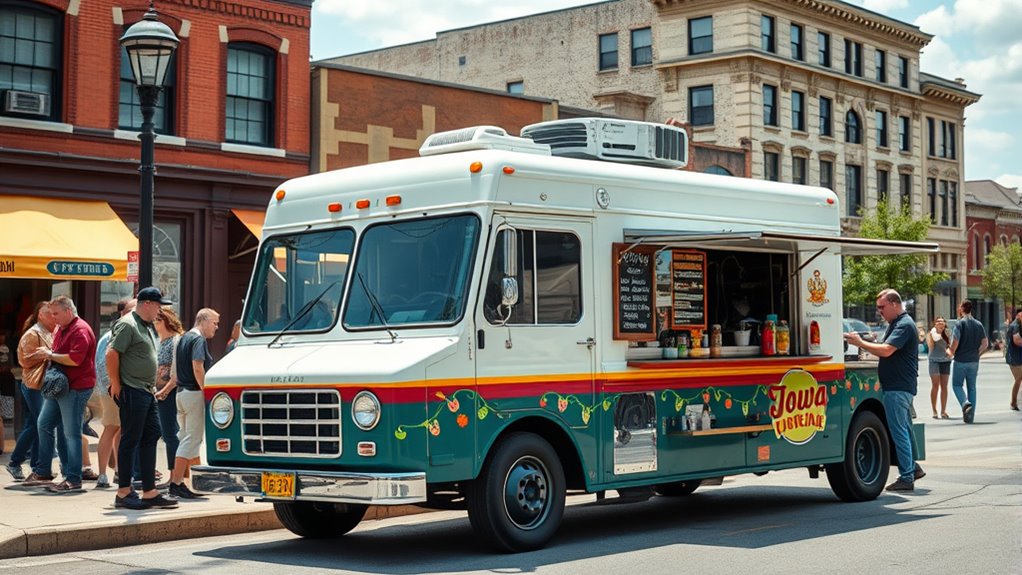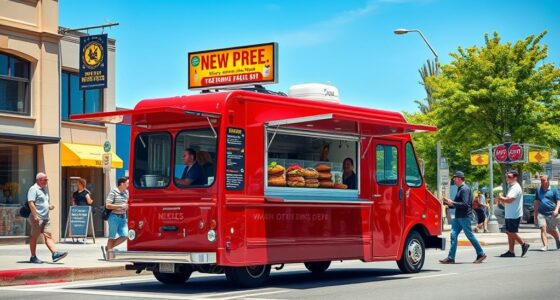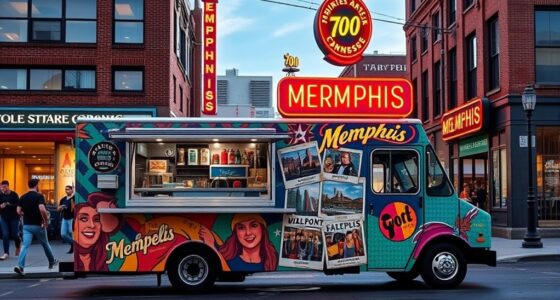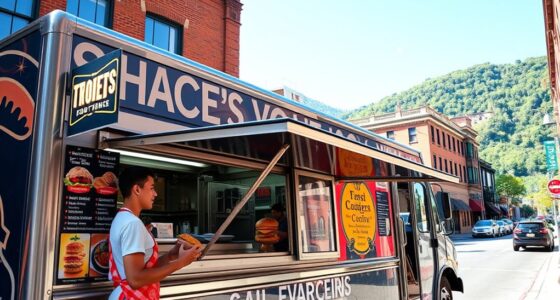To open a food truck in Iowa City, you’ll need to obtain permits like a food establishment license for about $250 annually, submit your application 30 days in advance, and plan inspections early. Be aware of zoning restrictions, parking limits, and location rules. Budget yourself $50,000–$250,000 for startup costs and focus on menu compliance with local standards. Successful marketing through social media and local events can boost sales. Continue exploring to get detailed steps for a smooth launch.
Key Takeaways
- Obtain necessary permits through Iowa DIAL, including food establishment and mobile vending permits, submitting applications 30 days prior to opening.
- Budget startup costs between $50,000–$250,000, covering vehicle, equipment, permits, insurance, and initial inventory.
- Follow zoning laws restricting operation near restaurants, downtown zones, residential areas, and parking limits with permits.
- Ensure menu compliance with truck classification and offsite food prep requirements, focusing on quick, safe, and zone-appropriate offerings.
- Use social media, participate in local events, and implement loyalty programs to effectively market and attract customers.
Navigating the Permitting Process in Iowa City
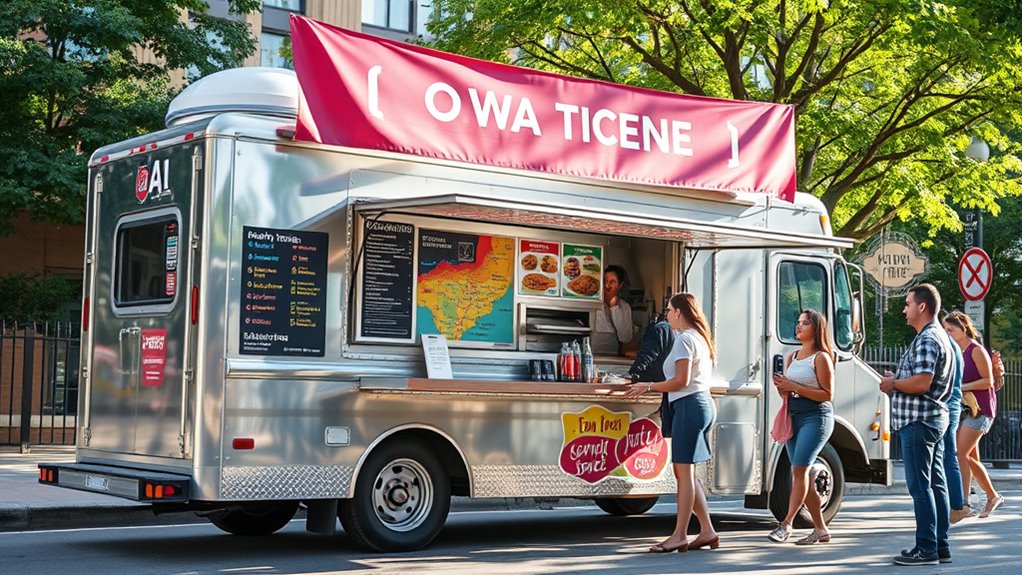
Handling the permitting process for a food truck in Iowa City requires understanding the specific licensing requirements and steps involved. First, you need a food establishment license, costing about $250 per location annually. Submit a complete application either online through the Iowa DIAL system or by mail to the Public Health Department, ensuring all forms are fully filled out to avoid delays. You must provide a detailed floor plan, menu, and equipment list for review. Before opening, your truck will need to pass a pre-operational inspection that confirms compliance with Iowa Food Code standards. Additionally, at least one employee must be a certified food protection manager. Remember, applications should be submitted at least 30 days before your planned start date, and renewals are due up to 90 days in advance. Incorporating food safety standards into your planning can help streamline the approval process and ensure compliance.
Understanding Operating Restrictions and Zoning Laws
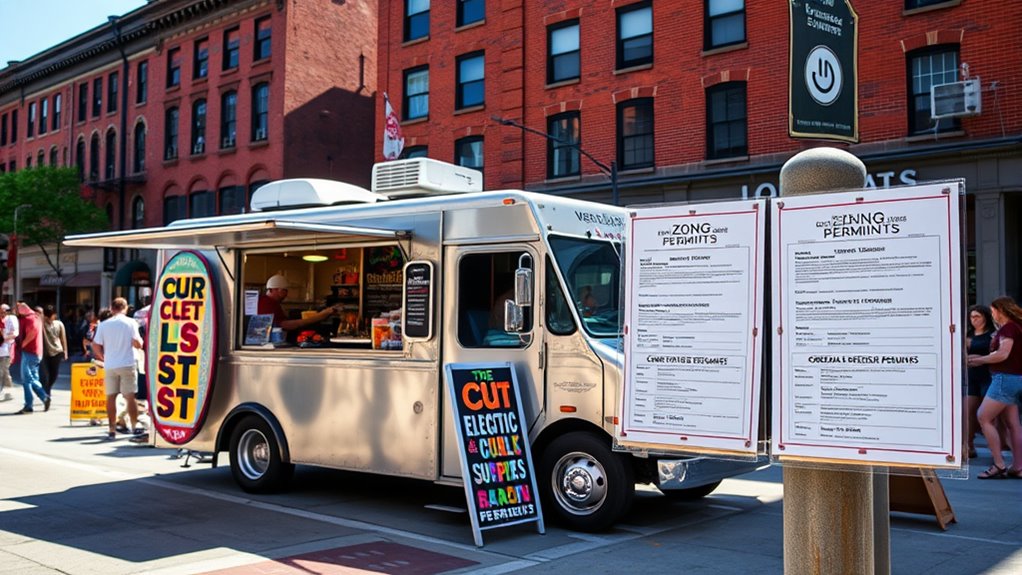
Understanding the operating restrictions and zoning laws in Iowa City is essential for running a successful food truck business. These regulations shape where and when you can operate. For example:
- You can’t operate inside the downtown zone on public rights of way.
- Food trucks must stay at least 150 feet from restaurant entrances to avoid competition.
- Residential zones and loading zones are off-limits for food truck operation.
- City rules may further restrict locations, adding extra layers of regulation.
- Familiarizing yourself with zoning compliance ensures your business remains within legal boundaries and avoids potential penalties.
Permits are required to operate legally, and applying for one involves submitting specific documentation and fees. Additionally, parking is limited to two metered spaces at a time, with a three-hour maximum in metered spots. Zoning laws aim to balance business needs with neighborhood character, requiring you to plan carefully and stay compliant.
Budgeting for Costs and Fees Associated With Food Trucks
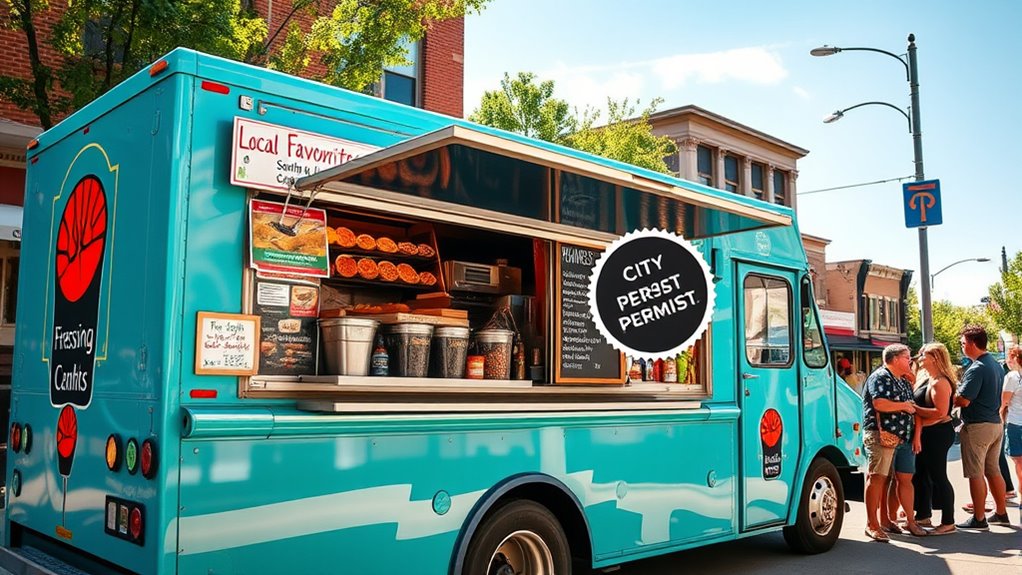
Budgeting for costs and fees associated with operating a food truck in Iowa City is essential to ensuring your business stays financially viable. Startup costs can range from $50,000 to $250,000, covering the vehicle, equipment, permits, insurance, and branding. Expect initial inventory expenses of about $2,000 to $3,000, plus $300 for serveware and supplies. Fuel and maintenance during startup may cost $500 to $1,000. Licensing fees in Iowa are around $250 annually, but national fees vary widely, sometimes exceeding $28,000 in strict cities. Monthly operating costs typically run $5,000 to $10,000, including ingredients, fuel, and insurance. Proper budgeting helps prevent cash flow issues, so consider funding options like loans or investments to cover these expenses. Understanding local permit costs and regulations can further help you plan your budget effectively. Additionally, considering heat pump efficiency can lead to significant savings on energy costs for your business premises.
Crafting a Menu That Complies With Local Regulations
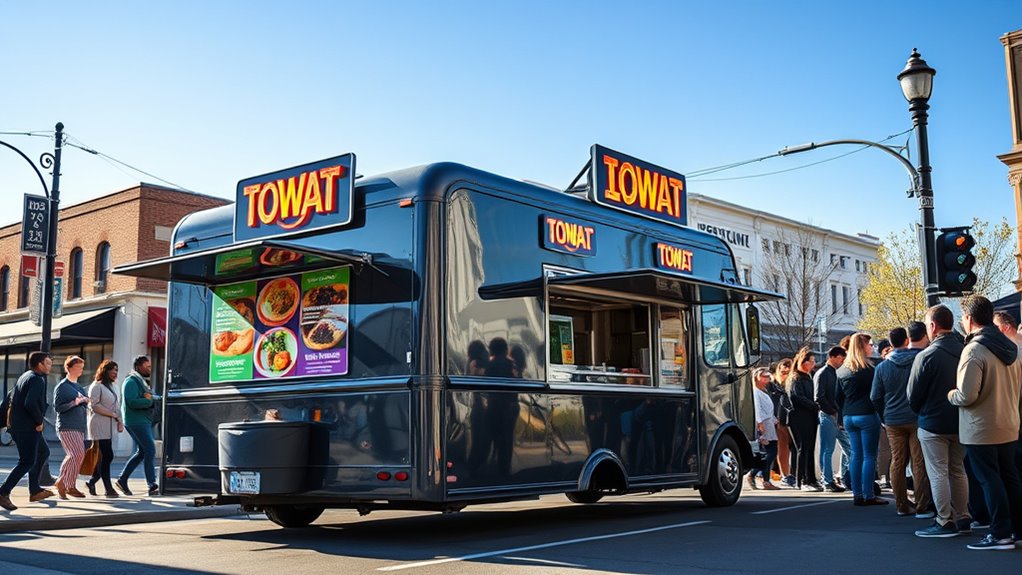
When crafting your menu, you need to guarantee it meets Iowa City’s local regulations and class requirements. Certain restrictions may limit the types of food you can serve based on your truck’s classification, and offsite food prep might be necessary for safety compliance. Carefully design your menu to align with these rules to keep your operation legal and efficient. Additionally, understanding the regulatory landscape for food trucks can help you navigate licensing and health standards more effectively.
Menu Compliance and Restrictions
Crafting a menu that complies with Iowa City’s mobile food unit regulations requires careful planning to guarantee all offerings align with local classification rules and safety standards. To do this, you need to consider:
- Your truck’s classification—whether it’s Class I, II, III, or IV—since each limits menu options differently.
- Restrictions on preparation—most preparation, cooking, or assembly is prohibited unless your unit meets specific health code requirements.
- Safe handling practices—potentially hazardous foods must come from licensed facilities, and handwashing sinks must meet temperature and hygiene standards.
- Location and operational limits—menu items should be quick and easy to serve within time and zone restrictions, avoiding restricted areas or methods requiring open flames.
- Implementing proper cash flow management ensures that your menu offerings remain profitable and sustainable within these regulatory constraints.
Aligning your menu with these rules prevents violations and ensures safe, compliant service.
Offsite Food Preparation Requirements
To guarantee your food truck operates legally and safely, you must use licensed offsite food preparation facilities that meet local health codes. Your chosen facility needs to be licensed in the county where it’s located, with approval pending a detailed application including a floor plan, menu, and equipment list. At least one employee must hold a certified food protection manager credential. Before opening, your truck must pass a health inspection confirming compliance with food safety rules. Offsite prep must occur in approved commercial kitchens, not residential or unlicensed facilities, and shared kitchens might require additional agreements. These facilities must maintain sanitation standards, proper refrigeration, and hygiene controls. Licenses should be secured at least 30 days before operation, ensuring smooth, compliant food preparation and delivery.
Effective Strategies for Marketing Your Food Truck
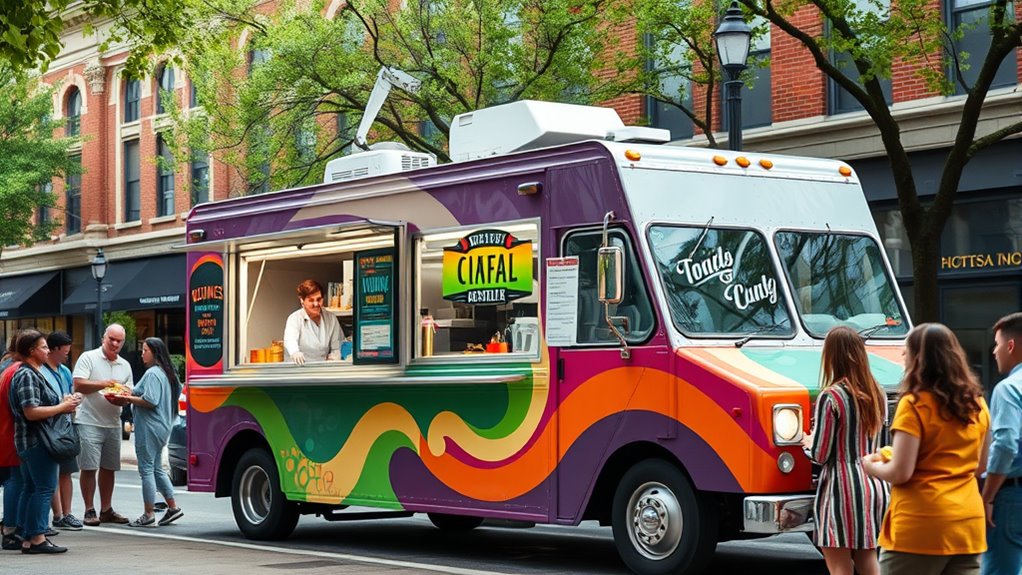
Effective marketing is essential for a food truck’s success, and leveraging multiple strategies can substantially boost your visibility and sales. To stand out in Iowa City, consider these approaches:
- Use social media actively—Facebook is key, with 75% of trucks engaging regularly. Campaigns can boost sales by around 20% and encourage customers to spend 15% more. Incorporating social sharing rewards into loyalty programs can further increase your social media reach by 50%, attracting more customers to your truck.
- Participate in local events and festivals—80% of trucks attend at least three annually, increasing foot traffic and brand recognition.
- Build customer loyalty through programs like discounts or freebies, which can increase repeat visits by 30%. Use email lists to stay connected.
- Leverage data analytics and GPS apps to target your audience precisely and optimize menus and promotions, maximizing your marketing ROI. Digital tools like GPS, analytics, and review platforms enable better customer targeting and feedback management, ensuring your marketing efforts are data-driven and effective. Additionally, understanding customer engagement can help tailor your messaging to resonate more deeply with your local audience.
Planning Your Application Timeline and Compliance Schedule
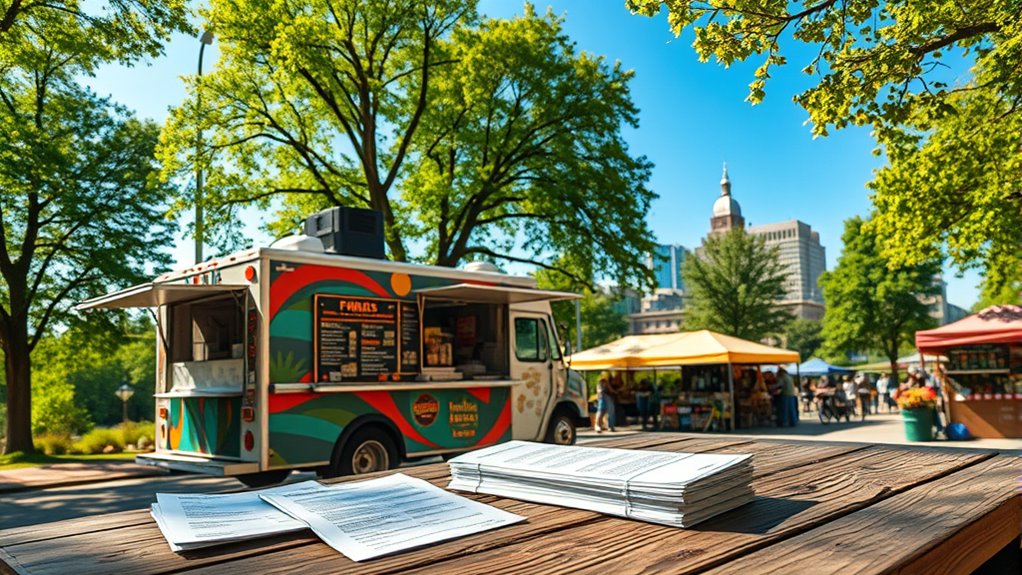
To keep your food truck operation on schedule, you should submit your applications early and plan for inspections right after. This way, you can avoid delays and guarantee all requirements are met before your launch. Staying proactive helps you navigate the permit process smoothly and stay compliant. Incorporating juice cleansing into your health and wellness offerings can also attract health-conscious customers and boost your business.
Submit Application Early
Submitting your mobile vending permit application early gives you a crucial advantage in the planning process. It ensures you have enough time for city and health department reviews, avoiding last-minute delays. To maximize your timeline, consider these steps:
- Submit your application before the March 1 deadline to meet city requirements.
- Contact Johnson County Public Health early to review health code compliance and plan inspections.
- Gather all necessary documents, including proof of permits, insurance, and property owner consent.
- Schedule inspections, like fire and health, well in advance to prevent delays.
- Be aware of expiration dates on your required permits and ensure your documentation remains valid throughout your planning process.
Schedule Inspections Promptly
Scheduling inspections promptly is essential to guarantee your food truck remains on track for a smooth launch. Early planning helps ensure your pre-opening inspection happens with enough time for corrections. Coordinate with the local health department during business hours (8:00-4:30, Mon-Fri) and prepare all documentation, including floor plans, menus, and equipment lists. Having a certified food protection manager on-site is also crucial. Use the following schedule to stay organized: Deaf Vibes
| Inspection Type | Timing | Purpose |
|---|---|---|
| Pre-opening inspection | 30 days after plan review | Verify compliance before opening |
| Routine inspection | Spontaneous, based on risk | Assess ongoing compliance |
| Recheck or Letter | After violations are corrected | Confirm violations are addressed |
Prompt scheduling minimizes delays and supports continuous operation.
Frequently Asked Questions
Can I Operate My Food Truck Outside Iowa City Temporarily?
Yes, you can operate your food truck outside Iowa City temporarily, but you’ll need to acquire the appropriate permits from the local health department where you plan to operate. If you’re at a single event, apply at least 3 weekdays in advance for a Temporary Food Establishment license, valid up to 14 days. For multiple events, request an annual license at least 30 days prior. Always guarantee compliance with health and safety regulations.
Are There Specific Health and Safety Certifications Required for Staff?
You’re encouraged to prioritize safety and professionalism. Iowa requires your staff to complete a state-approved food safety training course and pass an exam, ensuring they handle food responsibly. A Certified Food Manager certification is also necessary for leadership roles. These certifications, valid for three years, demonstrate your team’s commitment to health standards, creating trust with customers. Online options make it easier to stay compliant and maintain high safety standards effortlessly.
How Do I Find Available Permitted Parking Spots in Iowa City?
You can find available permitted parking spots in Iowa City by checking the Iowa City Code Title 9, Chapter 4, for detailed rules. Visit the city’s website under Permits and Licenses for updated maps and guidelines. You can also contact the Building Inspection Services at (319) 356-5123 for personalized assistance. Always look for signage and verify meters are operational before parking your food truck.
What Are the Insurance Requirements for Operating a Food Truck?
Think of your food truck as a ship sailing Iowa City’s streets. To keep it afloat, you need a sturdy insurance anchor. That means at least $25,000 per person and $50,000 per accident for bodily injury, plus $10,000 for property damage. Commercial auto insurance is essential, and proof of coverage is required for registration. Additional policies for theft, fire, or serving alcohol might also be necessary to guarantee smooth sailing.
Can I Sell Alcohol From My Food Truck in Iowa City?
You can sell alcohol from your food truck in Iowa City, but you need to get the proper license from the Iowa Department of Revenue and local authorities. Make sure you display your license visibly and follow all rules about serving alcohol, like limiting servings per person and operating only in approved zones. Keep in mind, alcohol sales are regulated, so compliance is key to avoid penalties and stay legal.
Conclusion
Think of launching your food truck as tending a garden—you’ll need the right seeds (permits), water (compliance), and sunlight (marketing) to see it thrive. By carefully steering each step, you’ll cultivate a vibrant presence on Iowa City’s streets. Stay patient and attentive, and your efforts will blossom into a successful venture. With dedication and smart planning, your food truck will grow roots and flourish, becoming a beloved part of the community.
